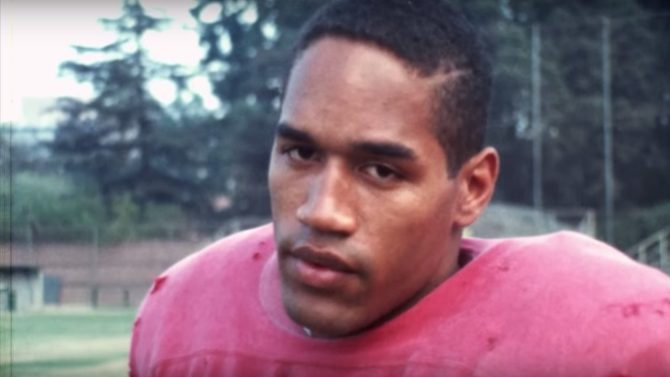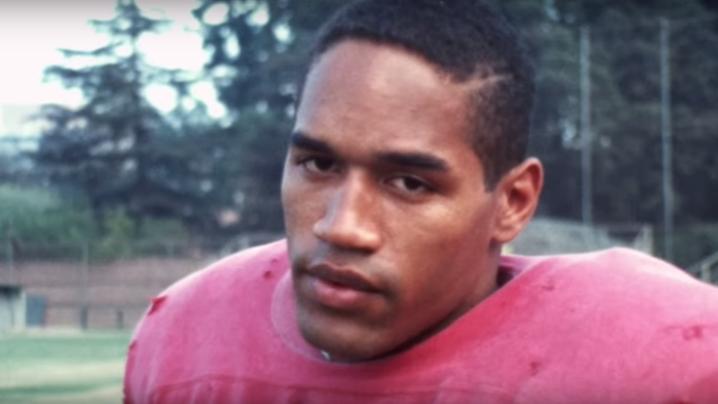[ad_1]

A young O.J. Simpson in a screenshot from the trailer for ESPN’s new documentary series, O.J.: Made in America
YouTube screenshot
Even if you were one of the millions who watched the white-Bronco chase live and followed the subsequent murder trial, or got hooked on The People v. O.J. Simpson, FX’s recent dramatized account of the behind-the-scenes ego-tripping of the legal “Dream Team,” you will be enlightened, fascinated and heartbroken by O.J.: Made in America, ESPN’s spellbinding five-part documentary series premiering in select theaters in New York and Los Angeles this weekend.
Ambitious and exhaustive, the meticulously crafted (and perfectly paced) tour de force is the deepest, darkest dive into the rise and astounding fall of Orenthal James Simpson.
The 7.5-hour work, directed by Emmy winner Ezra Edelman (remember his name), combines rare and never-before-seen footage—including, for the first time, the harrowing crime scene photos from Bundy Drive—with O.J. Simpson’s own voice unearthed from vintage interviews, and sound bites from a diverse range of over 70 interview subjects, many of whom have never spoken before.
Some of the interviewees are as eccentric as a Hollywood novel—the now openly transgender news helicopter pilot who was the first to spot the Bronco on the freeway, O.J. devotees, eye-rolling jurors, shady sports-memorabilia dealers involved in the Las Vegas caper that landed O.J. in jail, and, of course, the familiar faces of both legal teams (minus Chris Darden and Robert Shapiro).
Told in chronological order, the series follows O.J.’s early years as a charismatic, gifted high school and college athlete; his rise to pro football and pitchman fame; his tumultuous marriage to Nicole Brown; her being killed and the subsequent trial; and, finally, O.J.’s post-trial life as a pariah and current status as a convict.
But more than just presenting a well-researched biography of a complex man, the film does a brilliant job of dissecting how race was integral in this case. It examines the history of African-American migration to Los Angeles, as well as the long, sordid history of the Los Angeles Police Department’s treatment of African Americans and the cases of brutality that were slipped under the rug until the Rodney King incident became an international scandal. And how O.J., who famously remarked, “I’m not black, I’m O.J.,” ironically benefited from the frayed race relations in L.A. after the acquittal of four white officers charged with beating King.
In the documentary, Los Angeles is a character in its own right—all beach and sunshine on the surface, while tensions bubble underneath, ready to explode at any moment. It’s parallel to the jealous and explosive man that lived within the handsome, charming sports hero the public knew and loved. For this story wouldn’t have been such a sensation if the Juice hadn’t been a household name, and in addition to contrasting black Los Angeles and white Los Angeles, the series does a phenomenal job of examining the culture of celebrity.
“It wasn’t about money,” O.J. says in an early interview. “I wanted fame. I wanted to be known.”
For O.J., fame was a way to keep him “colorless” to his wealthy white friends in Brentwood and corporate America and give him a life of privilege. And while his fame and money could beat a murder rap, they ultimately couldn’t save him from himself.
O.J.: Made in America will air on ABC on June 11 with repeat episodes on ESPN beginning June 14.
Andréa Duncan-Mao is a Cali-bred, New York-based writer and producer who has written about entertainment, culture, beauty and race for Vibe, the Hollywood Reporter, TimeOut New York and XXL, and has written and produced specials for MTV and VH1. Follow her on Twitter.
Like The Root on Facebook. Follow us on Twitter.
[ad_2]





















